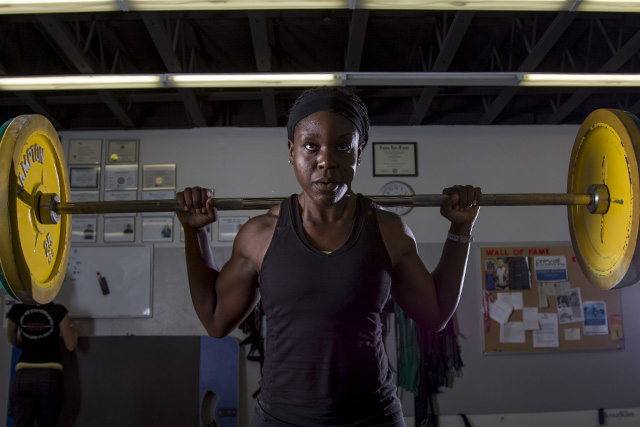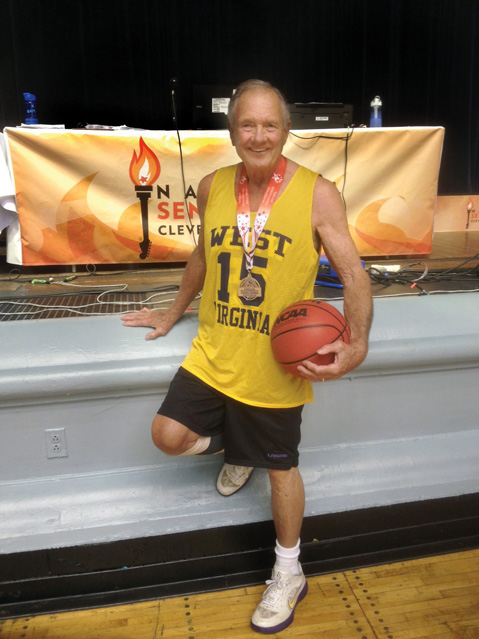Toboggan Run
UCSB Track Star Becomes U.S. Bobsled Brakeman

Push came to shove very early in Maureen Ajoku’s life. In 2007, the year she graduated from high school in San Jose and began her college education at UCSB, she lost both her parents — her father, Julius Chiedozie Ajoku, died suddenly of kidney failure in May; her mother, Nnenna Chinere Ajoku, succumbed to a lengthy bout with cancer in December.
“She was super strong,” Ajoku said of her mother, a registered nurse. “She’d take herself to chemo and pick up my sister and myself at school. My dad was an engineer. He was very ambitious.” Julius and Nnenna, natives of Nigeria, met each other in America, where they had come to pursue higher education. All three of their U.S.-born daughters have gone to college. “They wanted to provide a platform for us to grow and have a good life,” Maureen said.
Like her parents, Maureen has an African middle name. Hers is Ijeoma, which means “good journey.” She has had to forge her path as a solo traveler, and in the past year, she has gone farther than she ever expected, all the way to the citadels of winter sports in Europe. Ajoku has transformed herself from a college track-and-field athlete to a prospective member of the U.S. Olympic bobsled team.
She came to UCSB as a jumper and took up sprinting, hurdling, and throwing to compete in the heptathlon. The individuality of the sport taught her to fend for herself without the physical support of her parents. “I’m really an independent person,” Ajoku said. “I’m goal-focused. I really related to track. That’s who I am, an independent athlete.”
While majoring in sociology, she made her mark in Gaucho athletics with a record-tying long jump of 19’4 3/4”. In the weight room, she demonstrated raw strength that prompted Josh Priester, then the associate director of UCSB track and field, to suggest she look into bobsledding. “I didn’t understand; like, what’s bobsled?” she said. “I took it as a joke. It was really random. But he kept pressing it and pressing it. He introduced me to a male bobsledder on the national team.”
Her conversion proceeded last summer at the dizzying speed of a bobsled run — a combine in Utah, where she passed tests of quickness and power with flying colors; a training camp in Lake Placid, N.Y.; a competition of simulated takeoffs in Calgary, Alberta; and national team trials at Lake Placid last October. At the end of it all, Ajoku was selected as the No. 5 U.S. brakeman and bound for World Cup events in Germany, Switzerland, Austria, and Russia.
In the two-person women’s bobsled, the brakeman provides the propulsion at the start and jumps in behind the pilot, or driver, who steers the sled as it hurtles down a slick, twisting chute of ice. “I have to be super still and hold tight,” Ajoku said. “Any movement on my part can send the sled in the wrong direction. The feeling is like going down a mountain in a garbage can. I’m praying to God to bring us down safely. I’m so sucked into myself: Be at one with God, be calm, and breathe. Once we cross the finish line, the pilot will tap on my helmet and yell, ‘Brake.’ When I finished my first run, I had the biggest smile on my face. I was happy that I came out alive.”
A big step in Ajoku’s bobsled education was her first crash. “It was crazy,” she said. “We hit a curve, we flipped over, I let go of the sled, we kicked out, and I was just sliding down the track by myself. I was going full speed, and I was thinking, ‘When am I going to stop?’ It felt like forever. I had to have slid about 100 meters.” She learned the value of her helmet and the Kevlar burn vest strapped around her torso.
Ajoku’s experience in the World Cup consisted of practice runs at every site, including the state-of-the-art facility at Sochi, Russia, host city of the 2014 Winter Olympics. With all that behind her, she returned to Santa Barbara in the spring to work out on the track at Westmont College and do strength training at Prevail Conditioning on Haley Street. Peter Blumert, the director of performance at Prevail, is a former bobsledder himself and trained his future wife, Erin Pac, when she won a bronze medal as a U.S. driver at the 2010 Vancouver Olympics.
Ajoku began her second year with U.S. bobsledders a month ago at Lake Placid. They convened in Calgary last week for the U.S. National Push Championships. There was a fierce competition among 15 female brakemen, each of them scored for how fast they could push the sled. They were separated by tenths of a second. Ajoku placed ninth. Two former U.S. Olympians in track and field, hurdler Lolo Jones and sprinter Lauryn Williams, finished in the top five.
“It was pretty rough for me,” Ajoku said Monday after returning to Lake Placid. “I could have been more aggressive. I left a lot of room for improvement. I still have the national team trials in October. I’ll be working hard on my technique.”
Three combinations of brakeman and pilot will be chosen in January to represent the U.S. at Sochi. Whatever the outcome, Ajoku intends to keep developing her talent. “I’m the youngest one out there,” said the 23-year-old. “I’m grateful I have such an opportunity. I might do another year as a brakeman or become a pilot. It’s a big responsibility. I think I can do it. I want to be at the top.” … And the fastest one to the bottom.
MAKING TRACKS: Lindsay Schwartz of the Westmont-based Women’s Athletic Performance Foundation (WAPF), founded by Josh Priester, capped a fine year in the heptathlon by taking third place in the Thorpe Cup, a multi-event competition between the U.S. and Germany, at Chula Vista. … Jennifer Carey, who set four sprint records at UCSB, is competing in the IAAF World Championships in Moscow this weekend. Carey is the Irish national champion in the women’s 400 meters.

STILL GOT GAME: “I notice I’ve lost a step or two,” Bill Bertka said last week. It’s to be expected. Santa Barbara’s basketball Buddha celebrates his 86th birthday on August 8. He was the oldest player to win a silver medal in the three-on-three basketball tournament at the Summer National Senior Games in Cleveland. Bertka joined forces with Nemo Nearman, his teammate on the Santa Maria Golden Dukes in AAU basketball 60 years ago, on West Virginia’s entry in the 80-and-over division. Bertka said he concentrated on defense, which he described as “grab and hold.” His team, nicknamed Almost Heaven, made it to the final against a Wisconsin squad. Bertka was nursing several bumps and bruises when he returned to work as a consultant to L.A. Lakers general manager Mitch Kupchak.



